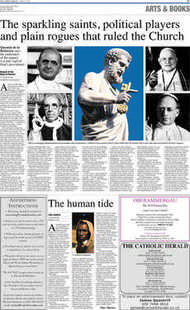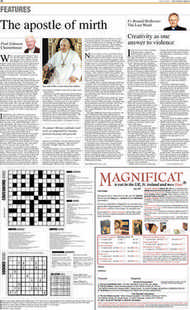Page 12, 15th May 2009
Page 12

Report an error
Noticed an error on this page?If you've noticed an error in this article please click here to report it.
Tags
Share
Related articles
Hitch And His Friends
Even No 10 Can't Spin The Word Of God
Mps Were This Week Hoping To Scupper Plans For A
Skilled In Smut Short On Brains
Answered Prayers
Journalists have led the way on exes
The actor Stephen Fry invoked a Christian tradition – albeit rather irately – when he said on Monday that instead of being terribly shocked about how MPs use their expenses, we should look at our own faults instead.
“I’ve cheated on expenses,” he said – and then addressing the general public à la Lord Kitchener – “and so have you!” Yes, I suppose we should all examine our consciences, and I do recall that when I first came to Fleet Street, back in the Sixties, I was provided with a quick expenses guideline by a more seasoned colleague (and Old Etonian).
“When you’re doing an interview,” he said, “arrange it for the Savoy, but always say you went to the Dorchester.” It cost sixpence to take a bus to the Savoy, while it cost seven-andsixpence to take a taxi to the Dorchester.
Many of us may have indulged in certain fiscal peccadilloes; but there were two inhibitory factors. One was that if you tried on a substantial cheat, you felt absolutely rotten about it – that is called “conscience”. And secondly, when putting over a substantial claim, you had to be able to supply the written evidence (receipts) and the justifiable cause.
And Mr Fry is somewhat out of date when he says that journalists are the greatest of expenses fiddlers and swindlers. Some might have had lavish exes in the old Fleet Street days, but the media has long entered its austerity period.
In the middle Nineties, I was despatched to China by the Sunday Telegraph to report a UN women’s forum there. To help pay for costs in Beijing, the Telegraph arranged for me to have US $2,000 in advance (credit cards were then seldom used in China). I duly spent the dollar float in the course of hotel bills, taxis, phone calls and the like; but soon after I returned to London I found the advanced dollars had been docked from my earnings, and would only be reimbursed when every last nickel had been accounted for.
There were times when journalists were, relatively, rather well paid: as a secretary in the Sixties, I earned £15 a week. I was in clover when, as a reporter, my wage went up to £28 a week. But nowadays, most journalists are often quite modestly paid (the majority of professional writers seldom gross more than £5,000 a year!) Journalists have also lost out on a justifiable expense, once allowed by the Inland Revenue: it used to be possible to take someone you were interviewing out to lunch (which often helped break the ice) and set that cost against tax. But the allowance has been abolished, and nowadays if you offer someone hospitality for professional reasons, you pay for it yourself.
And who decided we should practise such fiscal prudence? The politicians.
Certainly we should all examine our own consciences; (“Have I given a fair day’s work for a fair day’s pay?” was one of the conscience questions in my schoolgirl catechism). But that does not excuse the very public scandal of our political masters giving a highly plausible imitation of living like courtiers at the Versailles of Louis XV – apparently quite insulated from the lives of the people.
Agroup of leading architects has called for a boycott on Prince Charles’s critical speeches about architecture, their main objection being that the Prince of Wales is “too traditional” in his tastes (and is using his position to advance this heinous traditionalism). “It’s all the past, the past, the past,” said one luminary.
But what’s wrong with, literally, building on the past? Admittedly, architects often love knocking down old buildings to make way for their own confections – although they often choose to live in beautiful old houses themselves.
In Dublin in 1965 the most continuous vista of Georgian buildings in Europe was destroyed (in Lower Fitzwilliam Street) to make way for a Stalinist excrescence of modernist “brutalism”. A famous English architect, Sir John Summerson, had recommended the destruction of this Georgian vista, calling it “just one damn building after another”.
By their fruits ye shall know them.
The editor of the Jewish Chronicle, Stephen Pollard, has said that Pope Benedict’s visit to Israel is “misguided”. The German Pope is “suspect” in Jewish eyes, he says, and the episode with Bishop Richard Williamson last year put the cap on it.
Steve Pollard is a good egg, but I think the course of events will prove him wrong. The Holy Father’s visit to Yad Vashem was moving and meaningful. And it would be worse for Israel if the Vatican were to be part of an international grouping which stood aloof from Israel. The more contact between the Holy See and Israel the better.
[email protected]
blog comments powered by Disqus





















